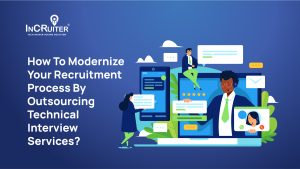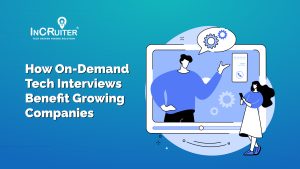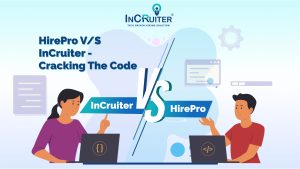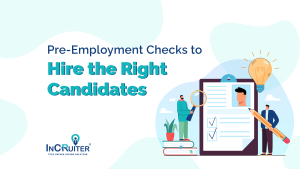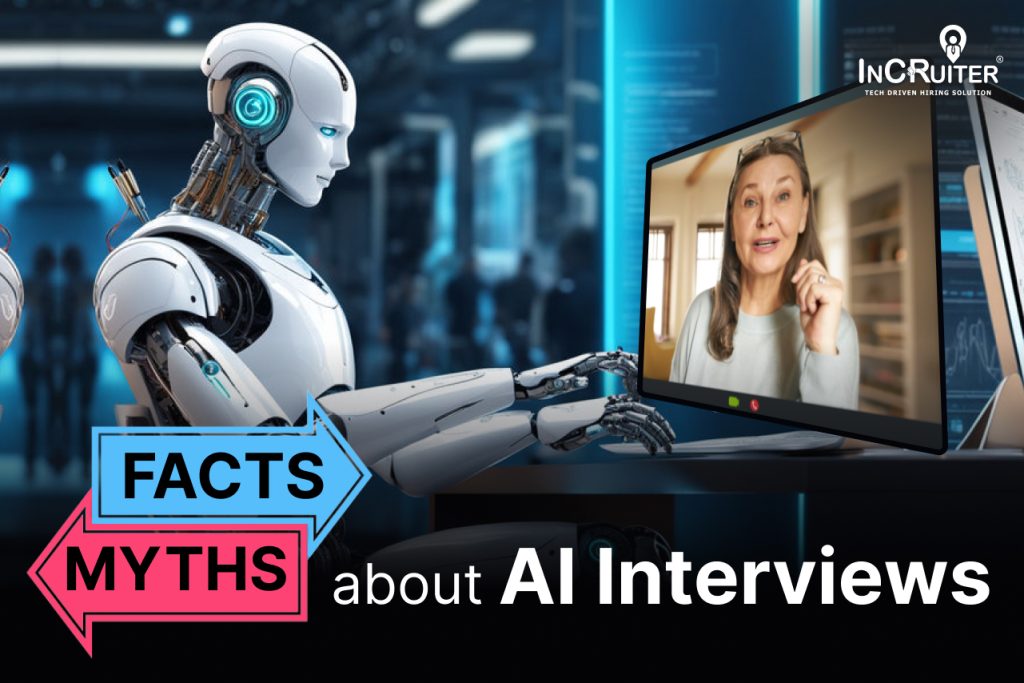
Recruiting the right talent is a tough job, and if you can get extra help, then who wouldn’t like it? That’s why businesses today are turning towards AI. AI interviews have gained significant recognition in recent times. Studies have shown around 80-88% of HRs are exploring or already using AI in recruitment processes.
AI-powered interviews are a popular way of conducting interviews today, but certain misconceptions are floating around about these interviews. Let’s debunk some of those myths in this article.
Top Myths and Facts about AI-Powered Interviews

There are certain misconceptions surrounding AI recruitment that could potentially misguide businesses. Let’s have a look at them and see what the actual facts are:
AI-powered Interviews Are Complicated to Use
A general misconception that people have is anything that uses AI is complicated to use. It is believed that AI interview software can only be used by people with a technical background or knowledge. Well, that doesn’t stand true.
Fact
AI integrated interviews can be used by anyone and everyone. User-friendly interfaces, intuitive functions, and seamless API integrations mean that even those without a technical background can easily utilize AI to streamline hiring. If used wisely, AI tools can easily enhance your recruitment process, making it more effective.
AI Interviews Lack Human Touch
Many recruiters believe that AI recruiting softwares makes the interview process more robotic and lacks a human touch. The AI bot doesn’t understand emotions, and candidates do not feel comfortable doing an AI interview.
Fact
While AI-driven interviews do rely on algorithms and data analysis, they are designed to simulate human interaction. Advanced AI platforms can gauge facial expressions, tone of voice, and body language to better understand candidates’ responses. They can differentiate whether the candidate is giving a fair interview or using some sort of unfair means.
AI-integrated interviews can be Manipulated
A common myth about AI interview software is that it can be easily manipulated. Skeptics often argue that candidates can easily exploit the system by crafting tailored responses, which leads people to think that using AI in interviews are not trustworthy.
Fact
However, the facts are totally different. By analyzing candidates’ responses, engagement levels, and performance metrics, AI algorithms provide recruiters with valuable data to make informed hiring decisions. These insights not only help identify top talent more effectively but also enable organizations to optimize their recruitment strategies.
Also Read: Benefits of AI-Based Interviews for HR Professionals
AI Recruitment is Only for Big Companies
HRs believe that AI recruitment is for big businesses and multinational companies. Big businesses tend to have more resources and opportunities to experiment with AI, which leads startups and small businesses to think that AI interviews are not for them.
Fact
In reality, AI recruitment is beneficial to all business sizes. Whether you are a startup or a grown company, using AI in interviews can be equally advantageous. With AI, organizations can create a more equitable environment, gaining efficiencies and insights that will help take their recruitment process to the next level.
AI-Driven Interviews are Only for Bulk Hiring
A common myth surrounding AI or one-way video interviews is that they are only suitable for bulk hiring. AI interview platforms have the capacity to conduct hundreds of interviews in a day, leading to confusion among HRs about whether AI-powered interviews are only suitable when hiring in bulk.
Fact
In contrast to this notion, AI stands out to be a game-changer for businesses across all scales. Small companies and multinational organizations can all use AI interviews to enhance their recruitment process. The only difference is that bigger companies tend to have more resources and opportunities to experiment with AI. Smaller businesses lack resources but can still benefit from one-way video interviews.
AI in Interviews Promote Bias in Hiring
It is a common belief that using AI in interviews will increase bias in the hiring process. Critics say that algorithms might pick up biases from the data they learn from, causing unfair results. While this concern is valid, it is also essential to understand that one-way video interviews need the proper implementation to give you the best results.
Fact
When supervised effectively, AI-powered interviews have the potential to mitigate bias by offering impartial evaluations and analysis. Using techniques such as anonymous screenings and the analysis of job descriptions for gender-neutral language, recruiters can turn AI to reduce unconscious bias and encourage diversity.
Also Read: HR Tech startup InCruiter secures ₹11 million funding
Key Takeaways
Just like every new thing comes with its fair share of pros and cons, so do AI interviews. Recruiters have several myths and doubts about this advanced interview method that prevent them from implementing it. In this blog, we have tried to burst some of those myths and provide you with facts about them. By staying informed, you can embrace the change and leverage AI’s strengths to empower your recruitment strategies.
Also Read: Understanding AI Recruiting Software: Features, Benefits, and Impact
Frequently Asked Questions
Ans: AI or one-way video interviews are a modern approach to the interview process for better and more effective hiring. These interviews use an AI video interview bot like IncBot, which screens candidates, conducts interviews, and provides detailed feedback reports.
Ans: AI interviews leverage technology to automate aspects of the interview process, such as initial screenings and assessments. Unlike traditional interview methods, they offer greater scalability and efficiency by providing instant feedback. Additionally, AI interviews can analyze subtle cues like facial expressions and tone of voice to assess candidates’ suitability, supplementing traditional evaluation criteria.
Ans: InCruiter provides the best AI interview services.
Ready to Transform Your Hiring Process?
Discover how our AI-powered interview platform can streamline your recruitment and find the best candidates faster.

